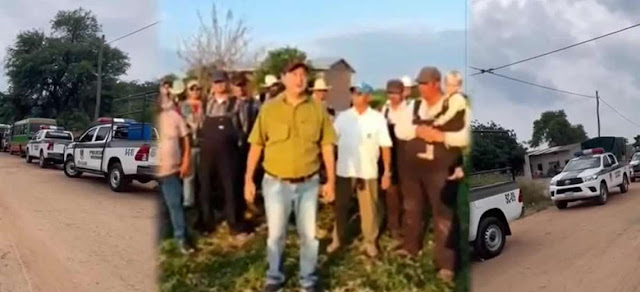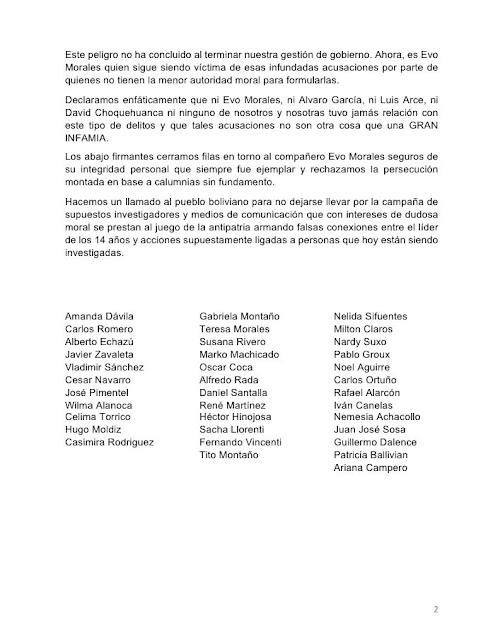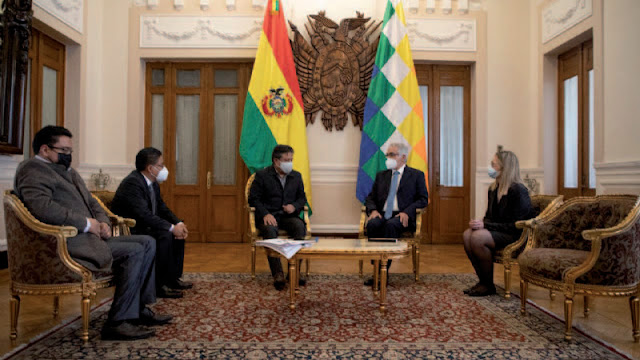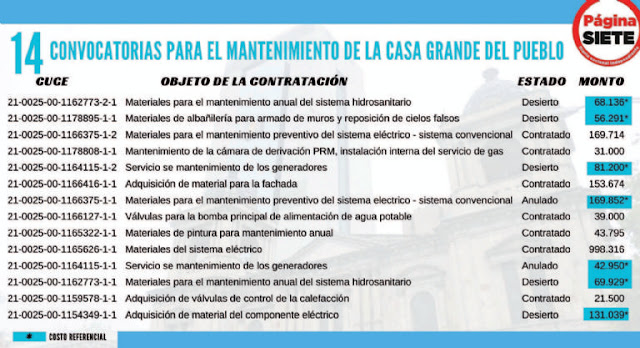Why is the US government offering Colonel Maximiliano Dávila a reward equal to the one it offered for “Chapo” Guzmán? Why was one of Dávila's alleged top lieutenants, former Major Omar Rojas, called the Bolivian "Pablo Escobar" by Colombian investigators? For more than 25 years, the alleged Bolivian drug traffickers have not made enough demerits to achieve such considerations. Moreover, in all that time, there was no more talk of "big fish" in drug trafficking in the country.
Thus, Dávila, former director of the Force to Fight Drug Trafficking, enters a select group of those most required by US justice. Not only the price assigned to him by one of the US reward programs is equal to that of the most important Mexican drug trafficker in recent years. The United States has also offered $5 million to anyone who gives information on, for example, Amir Muhammad Sa'id Abdal-Rahma al-Mawla. He is the second leader of the Islamic State of Iraq and Syria, better known as ISIS by its acronym in English.
Of course, when he was promoted to head of ISIS, the price of the data on Abdal-Rahma al-Mawla rose to 10 million dollars. In other words, Dávila seems to have been placed on a second or third rung of importance. Something like this also happened, for example, with the Venezuelan Maykel Moreno, president of the Court of Justice of that country, also valued at 5 million. While the price for Vice President Tareck El Aissami or for the President of the Venezuelan Congress, Diosdado Cabello, is 10 million.
For the Venezuelan president, Nicolás Maduro, the US offered, already in March 2020, 15 million dollars. Washington accused the Venezuelan president of directing the so-called Cartel de los Flores. It is not yet known who the US authorities place above Dávila in these narco-hierarchies. However, the US drug enforcement agency, DEA, slipped something into the reports of the agents who spoke with Dávila and Rojas. According to the DEA, Dávila and Rojas "described their extensive drug trafficking experiences and their connections to the highest levels of the Bolivian government." Dávila, it is worth noting, is the third former national director of the Special Force to Fight Drug Trafficking who falls for this crime.
Transcontinental partners?
The list of alleged drug traffickers and terrorists required by the US places Dávila alongside figures that seem very distant in space and causes. They are also there, for example, Muhammad Kawtharani, listed as a "high-ranking leader" of the Hezbollah forces and for whom they offer 10 million dollars. He has also offered monetary compensation of up to $15 million for information that could help disrupt the financial apparatus of Iran's Islamic Revolutionary Guard Corps and its fearsome Quds Force. And among these virtual “most wanted” by the first world power are two leaders of the remnants of the Revolutionary Armed Forces of Colombia (FARC): Seuxis Hernández Solarte, alias “Jesús Santrich”, and Luciano Marín Arango, better known as “Iván Marquez”.
However, the distances between Dávila and Rojas with Hezbollah, Iran and the Colombian guerrillas are shortened when considering the new cocaine routes. "Bolivia has become a kind of 'cocaine hub,' a drug concentrator," says Jaime Pérez (fictitious name), former parliamentarian and former authority, applied to security issues. From here, especially from the Cochabamba-Santa Cruz axis, Peruvian and Colombian cocaine, Paraguayan marijuana, and fine cocaine are also produced. Six main routes depart from Bolivia that feed the markets of neighboring countries and those that have been opened in recent years in other continents. (...) For this reason, the presence of "emissaries" has been verified, as Minister Carlos Romero said, from all the continental cartels. But, in addition, as various security organizations denounced, they added FARC guerrillas and militants from the Hezbollah organization as well as Iranian operators.
The Hezbollah terrorist group has been identified as one of the most used in the Middle East to produce and trade drugs. It is considered the wealthiest terrorist organization on the planet. Its main territory, the Bekaa Valley in Lebanon, is one of the largest opium and marijuana production areas in the world. Their drug trafficking routes are also directed towards Europe to obtain good profits. The DEA identified in 2016 a hierarchical structure within Hezbollah that has been in charge of its illicit operations since at least 2007. In addition, it has a direct logistics, business, and readiness relationship with Iran's Quds Force.
Very active since 2006
As early as June 2006, former DEA operations chief Michael Braun assured US lawmakers that Hezbollah was "moving tons of cocaine" from South America to Europe and that it had developed one of the "most sophisticated that has ever been seen. Apparently, with the scheme fully consolidated, the most recent DEA reports have indicated that businesses with Latino mafias were identified. They cite the Los Zetas cartel from Mexico and the Oficina de Envigado from Colombia. In addition, it is claimed that Hezbollah operators sealed agreements with the National Liberation Army (ELN) and the residual FARC.
Starting in 2006, on several occasions, reports of the presence of Iranian and Hezbollah operators in Bolivia arose. For example, on May 17, 2012, the Italian newspaper “Corriere della Sera” published a report on the presence of the Lebanese terrorist group in Bolivia, Brazil and Colombia. It also pointed out that the intelligence services of Latin America "raised their alert levels" due to that presence. During those years, a growing and controversial presence of high-level Iranian operators also drew attention in Bolivia.
On February 18, 2011, the Iranian Government Minister, Ahmad Vahidí, arrived in Bolivia. He came nothing less than to participate in the inauguration of the Defense School of the Bolivarian Alliance located in Santa Cruz. The fact unleashed a diplomatic conflict of proportions with Argentina due to the remarkable profile of Vahidí. He had been head of the Quds Force when the attack was perpetrated on July 18, 1994 against the Asociación Mutual Israelita Argentina (AMIA) that caused 85 deaths.
In November 2006, the Argentine federal judge Rodolfo Canicoba Corral considered him one of the masterminds behind the attack in Buenos Aires. That attack was orchestrated both by the Quds force and by its inseparable partner Hezbollah. The investigations of the prosecutor Alberto Nisman (who died in 2015 by presumed suicide) described Vahidí's conduct in that attack in detail. Five months ago Ahmad Vahidí was ratified as Minister of Government by the new Iranian government.
The Iranian-Lebanese connection also reached Colombia significantly. The American analyst Joseph M. Humire, in an article published in November in various international media, has indicated: “Within the files recovered in October 2020 by the Colombian Army on the computer of the assassinated ELN commander, alias Uriel, they revealed audios saying that in Iran "they are very open" to providing the ELN with paid trips to receive training. Later, on July 29, 2021, the Colombian Army seized another computer, but this time from the leader of the FARC dissidents, alias Gentil Duarte, where they discovered communications from last December, declaring that the dissidents had established "diplomatic relations" with Iran".
From north to south
Later Humire, a security specialist, adds that the FARC and Hezbollah have a long history of collaboration. This dates from the attack on the AMIA. It was then found that a Colombian named Salman Raouf Salman, acting as a Hezbollah operative, worked with the FARC to smuggle explosives from Lebanon into the tri-border area for use in the attack in Argentina. He then adds more examples of collaboration between the two terrorist groups going back to recent years.
The new revelations had such an effect that Colombian Defense Minister Diego Molano declared in November 2021 that Iran and Hezbollah are enemies of his country. And if that is how they were felt in Colombia, Venezuela and even further north, they have also left an undeniable trail to the south. More precisely, the cells of the Islamic organization have been located in the Paraguayan Ciudad del Este, where the triple border with Argentina and Brazil is located. And to unite these two South American extremes, the most direct, least protected and most functional route of all is Peru-Bolivia-Paraguay, with Bolivia as the strategic axis. An axis that the analyst Manuel Morales Álvarez has highlighted that "allowed the globalization of the cocaine markets by reaching other continents."
"They come from Colombia and the central highlands of Peru to the 'kitchens', where the base paste is purified, located around Santa Cruz de la Sierra, in Bolivia - journalist Gustavo Sierra has written in a report on Hezbollah for the Infobae portal -. From there they go to Paraguay. They easily reach Ciudad del Este, cross the Friendship Bridge to Foz do Iguaçu to São Paulo, in Brazil, and the Tancredo Neves Bridge to Puerto Iguazú in Argentina. From the missionary city, the Paraná does the rest. The cocaine goes down in barges to the ports around Rosario or goes directly to Buenos Aires where ships full of soy await to camouflage the cargo that will give them the greatest profits.
The text emphasizes the importance of a place as strategic as that of the Triple Frontier. “Right now the two big Brazilian cartels, the First Command of the Capital (PCC) and the Comando Vermelho (CV) are fighting it - adds Sierra-. But there are also other players involved in the business, from Bolivian and Paraguayan groups to Lebanese Hezbollah agents who send shipments to their own organizations in Europe, the Middle East and Asia.”
The questions of the moment
And it is precisely on that route in time and space that is so Hezbollain and Iranian where Dávila and Rojas fit. The Bolivian cartel, with its respective "Chapo" and "Pablo Escobar", caught the attention of DEA agents for its scope and boast of power. In fact, the skein began to unravel in March 2021 when Rojas was captured in Colombia.
The organization of Dávila, Rojas and those who are their superiors, in parallel with Hezbollah and Quds, jumps from the South American to the continental.
"In recent years, the US had somewhat relaxed its pressure on Bolivia because the cocaine that left the country basically went to Brazil," Pérez says. But, suddenly, a kind of Bolivian cartel emerges with central operators like Rojas and Dávila, associated with an old big shot like 'Techo 'e Paja' Roca who have opened routes to the United States. It was reported that Rojas met with people from the ELN and the FARC and that Dávila practically controlled Bolivian territory. His ‘services’, as cited by the Colombian revelation, include drugs, planes, protection and arms sales.”
In other words, the Hezbollah route with an addition: there is talk of a strange arms trade to a country where the sale of arms is free. There is talk of protection and provision of machine guns at a time when these services were provided by partner organizations. A mega-scandal that suddenly turned Bolivian politicians upside down and opened up a wave of questions with unpredictable answers.
Are the coincidences between the route of Dávila and Rojas with the operations of Hezbollah just that, something stronger or much more? Which Bolivian partners do Hezbollah operators support their work in the strategic Bolivian corridor? Will Dávila be extradited, today detained in Bolivia accused of legitimizing illicit profits? Are the new DEA operations the result of the confessions of Venezuelan and Bolivian operators (including former Minister Arturo Murillo) recently detained in the US? Do the DEA and other US intelligence agencies have already identified the bosses of Dávila and Rojas?

















